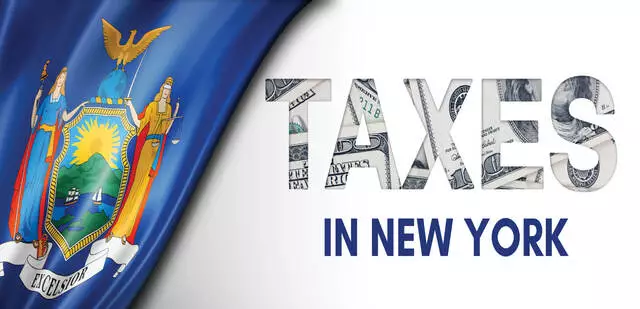
The DTA did very little in early November, but since then has been flooding its website with content. And the content is not always being posted by the DTA on Thursdays, which used to be the standard schedule. And that screws up TiNY’s production schedule. Who are we kidding? TiNY doesn’t have a schedule!
Rather than hit you with a mega-posting here, we’ll break the cases down into three episodes. This is the first episode in the series, but we’re not going to call it “Episode I.” Instead, it’s “Episode IV: A New Hope.” Hey, if it was good enough for George Lucas, it’s good enough for TiNY. So:
About a month ago, in an administrative hearing agency far, far away …
[Cue TiNY’s theme music. If we had any. Which we don’t. TiNY is a blog, and like most blogs it doesn’t have any audio component. But if TiNY had theme music, it would be something topical like The Beatles’ “Tax Man” or The Kinks’ “Sunny Afternoon,” both of which are about the high levels of progressive taxes being imposed in the 1960s by the British Labor government headed by Harold Wilson. Feel free to fact-check me on this.]
Decisions
Matter of Sunoco, Inc. (November 18, 2024); Div’s Rep. Bruce Lennard, Esq.; Pet’s Rep. Jennifer White, Esq., Aaron Young, Esq., and Georgia Tsoflias, Esq.; Article 9-A/Apportionment (Chris Doyle).
I wrote about ALJ Fiore’s determination here , and that post encouraged Petitioner to take its case to the Tribunal since, I thought, the ALJ Determination’s legal analysis was a little on the light side. The case involves Petitioner’s “swapping” transactions in which Petitioner exchanges (with unrelated third parties) petrochemicals with particular chemical and geographic characteristics for petrochemicals with other chemical and geographic characteristics. The swapping transactions allow Petitioner to avoid needing to keep diverse inventories of fuels in various locations and are not unusual in the industry.
The ALJ found that the swaps are not “sales,” and therefore the values of the petrochemicals Petitioner received in the swaps as consideration were not includable in the denominator of Petitioner’s receipts factor of its Business Allocation Percentage (“BAP”).
A majority of the Tribunal agreed with the ALJ that swaps are not “sales” and therefore Petitioner’s BAP was not affected by the swaps. Commissioner Cahill disagreed and penned a rare dissenting opinion. He opined that the barter sale swaps were sales under classical tax doctrines. I hope Petitioner takes the case up on appeal because I think most tax professionals would conclude that the transfer of title and possession for consideration is a sale and thus the swaps are sales.
Petitioner’s case is not without its problems, however, one of which I should have taken more notice when I reviewed the ALJ determination: Petitioner booked the income tax effect of the swaps as producing a reduction in costs of goods sold rather than producing additional gross sales revenue. The bottom-line net profit is the same regardless of which route is taken. But I have recently discovered that the Division’s Corporation Tax Field Audit Guidelines refer to gross sales reported on line one of the federal income tax returns as being the usual source of the “receipts” used to calculate a taxpayer’s receipts factor. And while I hardly ever sympathize with the Division, if its treatment of the swap transactions was driven by a consistent application of a pre-existing guideline to the information reported on Petitioner’s federal income tax return, I can at least respect the process even if the result seems a little hinky.
Determinations
Matter of Ben-Shimon and Fuzailov (SALJ Gardiner, November 14, 2024); Article 22/DTA’s jurisdiction (Zoe Peppas).
Petitions filed at DTA must be signed by the petitioners and include a copy of the statutory notice being protested.
Petitioners here did not sign their petition or include a copy of the statutory notice. The Division made a written request for Petitioners to correct the deficiencies. But they never did. After a suitable waiting period, the petition was dismissed with prejudice.
Matter of Graf (SALJ Gardiner, November 14, 2024); Article 22/DTA’s jurisdiction (Zoe Peppas).
As seen above, petitions filed at DTA must include a copy of the statutory notice being protested. Petitioner filed petitions and attached a notice of deficiency for the tax years 2019, 2020, and 2021. But Petitioner also included a response to taxpayer inquiry letter from the Division advising Petitioner that a notice of deficiency he’d been issued for 2021 was cancelled. As there was nothing left in controversy for 2021, Petitioner’s petition for tax year 2021 was dismissed with prejudice. The petition for the 2019 and 2020 years was determined to be still in-play. So, the Supervising Administrative Law Judge ruled that it will be addressed in “due course.”
Matter of Dowdell (Judge Law, November 21, 2024); Div’s Rep. Colleen McMahon, Esq.; Pet’s Rep. pro se; Article 22/Tax on unemployment compensation (Zoe Peppas).
Petitioners electronically filed a 2020 resident income tax return with New York State. They reported wage income, taxable interest income, ordinary dividends, a business loss, and capital loss. Petitioners did not report any unemployment compensation.
The Division issued a statement of proposed audit change, stating a discrepancy between its records and the Petitioners’ return. According to the Division, Petitioners received unreported unemployment compensation. The Division issued a notice of deficiency asserting additional tax and interest due. The Division’s information regarding the unemployment compensation came directly from the NYSDOL.
At the hearing, Petitioner testified he did not recall receiving unemployment benefits, though he did recall applying for unemployment compensation during 2020. Given the weakness of the evidence produced by both parties, Judge Law ruled against Petitioners based on the presumption of correctness that attached to the Division’s Notice, and the burden of proof being on the Petitioners. If Petitioners had a case, they could have proven it by having the Judge issue subpoenas to the NYSDOL seeking proof of payment of the unemployment compensation to Petitioners. Maybe next time.
Matter of Nacmias & Sons Auto Service, LLC (Judge Behuniak, November 21, 2024); Div’s Rep. Melanie Spaulding, Esq.; Pet’s Rep. Norman Berkowitz, Esq.; Articles 28 and 29/Successor liability (Zoe Peppas).
In 2008, Petitioner entered into a purchase agreement with Coney Island Sunoco Service Station, Inc., for the purchase of business assets. However, Petitioner did not provide the Division notice of its bulk purchase of the assets. The Division determined Petitioner was a bulk sale purchaser and therefore liable for sales taxes owed by Coney Island. The Division issued a notice of determination to Petitioner in April 2010 for those taxes. Thereafter, it appears that the Division diverted many of Petitioner’s regular sales tax payments to pay-down the bulk sale liability from Coney Island Service Station. On January 27, 2021, Petitioner filed a refund claim for the tax moneys it said had been improperly diverted by the Division.
The Division denied Petitioner’s refund claim because, allegedly, (a) the refund claim was not filed within three years from the time the return was filed or two years from the time the tax was paid, and (b) the assessments related to the claim were the result of a bulk sale transaction. Petitioner then filed a petition at DTA protesting the refund denial.
Petitioners bear the burden to prove an assessment is incorrect. But a petitioner who fails to timely protest a notice of determination “may still be entitled to subsequently protest the denial of a refund of the associated liability after payment thereof.” Though Petitioner failed to timely protest the 2010 notice of determination, it timely protested the refund denial notice. However, Petitioner failed to prove when or how much of the taxes had been paid within the two years prior to the filing of Petitioner’s refund claim. Therefore, Petitioner was determined to have failed to meet its burden to prove entitlement to the claimed refund, and the Judge sustained the Division’s refund claim denial.
Matter of Pang and Lee (Judge Law, November 21, 2024); Div’s Rep. Jennifer Hink-Brennan, Esq.; Pet’s Rep. Justin King, EA; Article 22/Penalty abatement (Pete Calleri).
This case involves the 2019 tax year extended filing and payment deadlines that applied during the COVID pandemic.
The Division issued to Petitioners a statement of proposed audit change proposing tax of $235,000 plus penalties due to Petitioners’ failure to timely file their 2019 New York State and New York City returns or pay tax when due. Petitioners paid the $235,000 tax liability but petitioned for abatement of penalties arguing that they attempted to file for an extension of the deadline to file a return and pay tax, but due to a glitch in New York’s electronic filing platform, it was not accepted, and the payment wasn’t withdrawn from Petitioner’s account. Petitioners speculated that processing issues related to the COVID pandemic prevented their extension request and payment from being filed by the extended July 2020 deadline.
Unconvinced by Petitioners’ arguments, ALJ Law denied their petition and sustained the penalties. Simply stated, Petitioners were unable to establish that they had filed a valid extension or paid tax when due. Petitioners offered no evidence, other than self-serving testimony, that they attempted to comply with DTA’s filing deadlines. Additionally, they could have easily mailed an extension request and payment to the address listed on the form. As such, Petitioners failed to establish that their failure to timely file and pay tax was due to reasonable cause and not due to willful neglect.
Matter of Edorsson (SALJ Gardiner, November 27, 2024); Div’s Rep. Michele W. Milavec, Esq.; Pet’s Rep. pro se; Article 22/DTA’s jurisdiction (Zoe Peppas).
Petitioner filed an ALJ hearing petition and included a copy of a correspondence acknowledgement notice, but not a statutory notice or conciliation order. The DTA requested a copy of the statutory notice Petitioner was protesting. Petitioner did not respond to that request. The DTA issued a notice of intent to dismiss the petition on the basis that the DTA lacked jurisdiction to consider the merits of the petition because it was not “in proper form.” Petitioner again did not respond. The petition was dismissed.
Matter of Hogan (SALJ Gardiner, November 27, 2024); Div’s Rep. Emil Kambala; Pet’s Rep. pro se; Article 22/DTA’s jurisdiction (Pete Calleri).
Petitioner filed a petition with DTA but failed to attach the statutory notice under protest. DTA made a written request for Petitioner to provide the notice, but again Petitioner failed to do so. DTA then issued a notice of intent to dismiss the petition, to which Petitioner also did not respond. Therefore, because Petitioner failed to attach a notice as required by Tax Law § 2008, DTA lacked jurisdiction and Judge Gardiner dismissed the petition.



